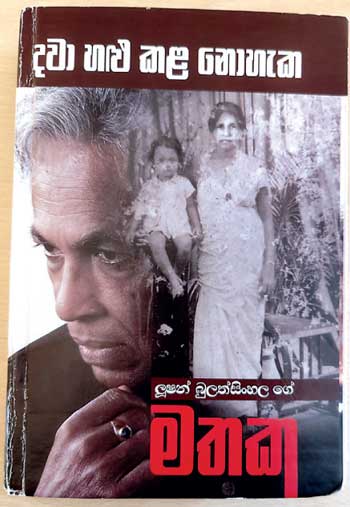Thursday Feb 19, 2026
Thursday Feb 19, 2026
Saturday, 16 March 2024 00:00 - - {{hitsCtrl.values.hits}}
The stories, though they seem personal on the surface, the truth they tell, and the messages conveyed are universal. Persistent cruelty and hypocrisy of a society that destroys itself together with all its members is poignantly portrayed in this book. This is a book that must be read not only for its literary value but for the historical information that highlights social evils that pervade Sri Lanka
 By Helasingha Bandara
By Helasingha Bandara
The book entitled “Dawa Halu Kala Noheka” of which the English translation is “Cannot be Burnt to Ashes”, does not speak about burning someone’s material wealth but about indestructible memories, sweet or otherwise, of someone who has been propelled onto the peak of Sri Lanka’s cultural landscape. It is not a long short story, nor is it a novel, but an anthology of bittersweet anecdotes that can fall into the genre of creative writing. Indeed, only a person with a penetrative mind can line up such anecdotes to be remarkably poignant, sombre yet comforting, evocative of distant associations, yet not too explicit.
When the versatility of the author, being a playwright, actor, director, producer, TV and radio presenter and especially a lyricist is revealed, little is left for the imagination to be surprised that he has authored a mesmerising anthology of anecdotes of personal, melancholic, amorous, yet didactic nature.
His Rathuhettakari transcended the traditional hallmarks of stage plays of the day while Tharawo Igilethi catapulted him to the pinnacle. His unique style revolutionised theatre productions that were to follow. With those two stage pays, he left an indelible mark in the field of Sri Lanka theatre that reverberated over many decades.
His enduring success and the ability to seamlessly blend words was remarkable. Most of his songs would last many decades to come. His iconic songs such as Heen nage, Tharu malyayama, Siri yahane, Ahasin tharuwak, Viduli minipahan have achieved widespread recognition, and critical acclaim. To highlight his innovative prowess as a songwriter, let us analyse two lines of his song “Kanyavi” that resonated with the entire population.
“Lihil saluwa anathure weteddi,
Payodhara thudu Ikibindiddi
Vayanna Veena”
His incomparable ability to transcend vulgarity of lust through the choice of words made him a cultural phenomenon.
“You virgin with burning amorous desire, go on playing the harp while the silky attire is facing the danger of falling to expose nudity and while the nipples are wailing to be fondled”.
A young virgin who had been precariously aroused by lust has been described in such subliminal phrases that the listener would easily forget the vulgarity of the event. The only other parallel that I can draw to highlight the quality of the lyrics of this song is that of KDK. Dharmawardana’s Kumariyaka Paa Salmba Seluna.
Lucien Bulathsinghala’s book, Dawa Halu Kala Noheka, is another glowing testimonial of his versatility as a writer or an artiste. Despite the sombre yet comforting nature of the stories, an unmissable under-current of tragedy that has been closely associated with his personal life is running through. The book is a grave reminder of a cruel society that has been portrayed by ultra-nationalists as Buddhistic and pure. Throughout his career he has met with hindrances that have been created by friend and foe alike.
Bureaucrats of his day did not seem to have manifested any sense of decency but empty arrogance and hypocrisy. Instead of respect for and admiration of young talent, they have constantly struggled to maintain their assumed status by oppression. This writer’s imagination is that the bureaucrats did not know that they were worms in a cesspit. Some were bigger than others, yet they were worms in the same cesspit. Such words like Isay, thamuse, when addressing junior employees were commonplace and were meekly accepted. Isay must have come from the English I say but when joined to “Isay” to address subordinates with an authoritative tone, it becomes derogatory. “Thum se” (Hindi) may be the origin of thamuse. It was not used to address someone who had more power or who was superior in position. Some of the lowly characters mentioned in the book had made no worthwhile contribution to arts or television/radio fields but have abused their position to hinder progress of shining young talents like Lucien.
Lucian’s life stories evoke a parallel between India and Lucian. India has destitution everywhere, but marvellous treasures are studded all over her indicating past glory. Similarly, Lucien has had a troubled life throughout, but his remarkable achievements are nothing short of miracles.
The love of his life that emerges through those anecdotes is unmistakable. Being young and inexperienced, Lucian seemed to have fallen head over heels. Despite all wrongdoings of his sweetheart, he does not accuse her in any manner throughout his storytelling. In his own words, “Devune, Thevune Ekama Landak wetha pemkala umathuweni”. Often it is too late to recognise madness associated with young love.
We mentioned earlier that the book is indirectly didactic. The stories, though they seem personal on the surface, the truth they tell, and the messages conveyed are universal. Persistent cruelty and hypocrisy of a society that destroys itself together with all its members is poignantly portrayed in this book. This is a book that must be read not only for its literary value but for the historical information that highlights social evils that pervade Sri Lanka.